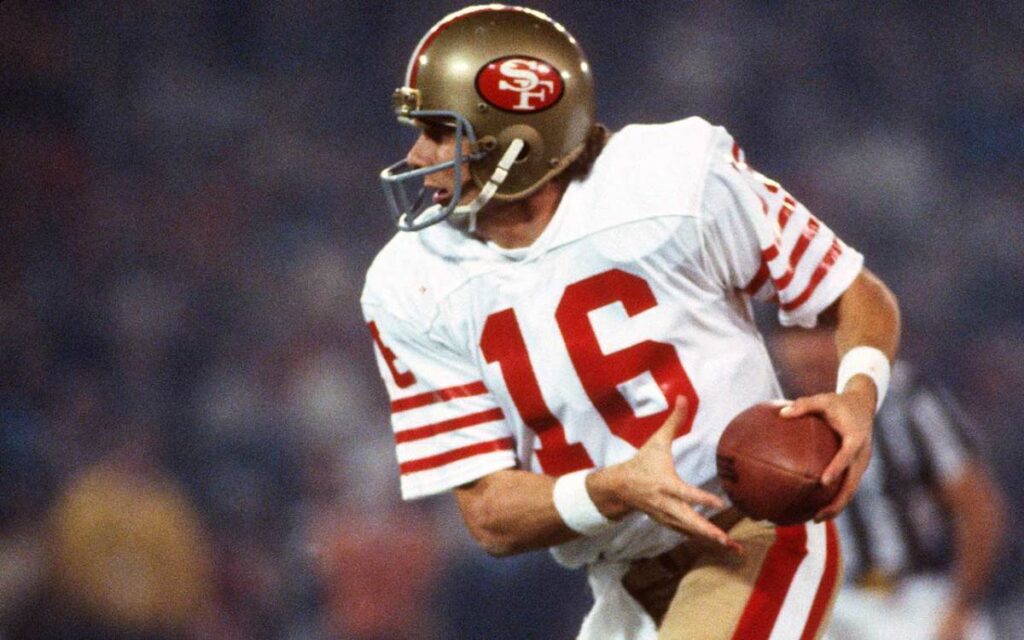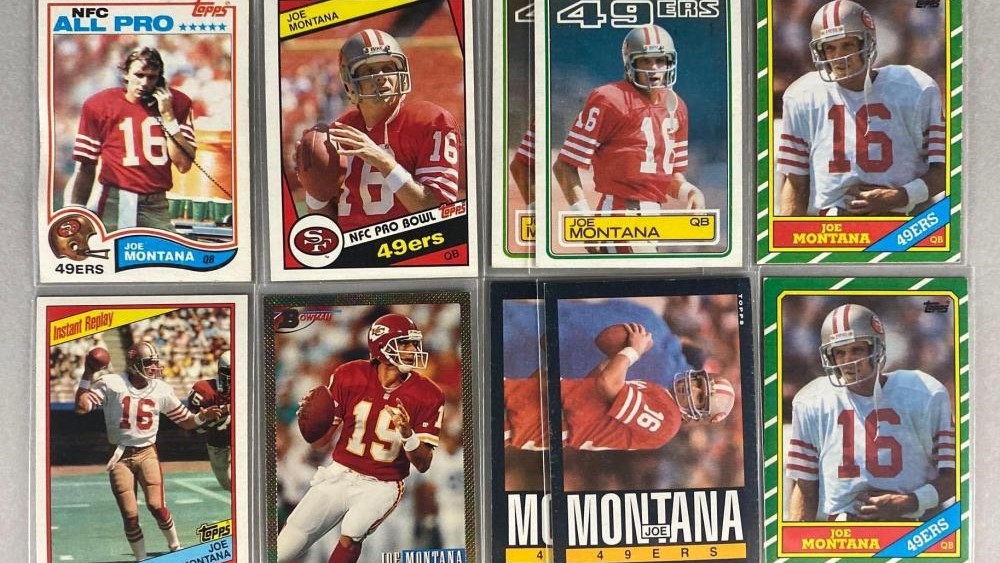Joe Montana, a renowned former NFL quarterback, has a variety of trading cards that have become significant for collectors. The article will explore the factors that determine the value of these cards, such as condition, rarity, and edition. We will also look at examples of specific cards and their market values, providing insights for both seasoned collectors and newcomers interested in the world of sports memorabilia. The focus is on understanding why Joe Montana’s cards are sought after and how their worth is assessed in the current market.
Most Valuable Joe Montana Football Cards
The value of Joe Montana football cards can vary widely based on factors such as the card’s condition, rarity, and specific edition. Here are some notable examples:
- The 1981 Topps Football Joe Montana Rookie Card is highly valuable, with a sold price of $114,000 and a CL Value (a value estimate) of $37,772.90.
- A 2019 Absolute Gold Kaboom First Year Rookie Card of Joe Montana was sold for $12,000 with a CL Value of $5,287.35.
- A 1994 Finest Refractor Joe Montana Rookie Card fetched a sold price of $10,000 and a CL Value of $6,739.89.
- For a more recent sale, the 2013 Panini National Treasures Joe Montana Colossal Jersey Number Signatures Prime #28 was sold for $517.
- Another significant card is the 1981 Topps #216 Joe Montana, which in Gem Mint 10 condition has reached a high recorded price of $64,580. However, cards with lower grades like 9.5 can be valued around $7,000, and ungraded versions can be under $100.
- The 1986 Topps #156 Joe Montana is also a popular choice, potentially selling for upwards of $3,699 for a perfectly graded copy.
The value of Joe Montana football cards has been fluctuating, with some experiencing decreases in value over time. For instance, the average price of the 2023 Donruss Downtown! #D-7 Joe Montana card recently was around $191.33.
Factors that Influence the Price of Joe Montana Cards
Several important factors affect the value of a Joe Montana football card:
- Condition of the Card: The physical state of the card is paramount. Cards graded higher on the condition scale (e.g., Gem Mint 10) are worth significantly more than those in lesser condition. The scale typically ranges from Poor to Gem Mint, with grades assessed by professional grading services like PSA or BGS.
- Rarity: Cards that were produced in limited quantities or are hard to find typically command higher prices. This includes cards with low print runs, special editions, or those from a particular set known for its scarcity.
- Historical and Player Significance: The player’s legacy and career achievements play a crucial role. Joe Montana, being a highly celebrated and accomplished NFL quarterback, adds considerable value to his cards. Key moments or milestones in his career captured on cards also add to their desirability.
- Special Features or Variations: Cards with unique features, such as autographs, jersey patches, errors, refractor finishes, or other special variations, tend to be more valuable. These features make the cards more unique and sought-after by collectors.
- Age and Vintage Status: Older cards, especially those from a player’s rookie year or early in their career, are often more valuable. The 1981 Topps Joe Montana rookie card, for instance, is highly prized, partly due to its vintage status.
- Market Demand: Like any collectible, market demand can fluctuate and affect the value. Trends in the sports memorabilia market, the popularity of the sport, and the player’s enduring legacy can influence demand.
For purchasing Joe Montana football cards, online marketplaces like eBay are popular options due to their wide selection and buyer protection programs.
Joe Montana Highlights and Career Overview
Joe Montana’s impact on the game of football is monumental, cementing his legacy as one of the greatest quarterbacks in NFL history. Known for his incredible poise, accuracy, and clutch performance, Montana was a central figure in the San Francisco 49ers’ dominance during the 1980s. His career, spanning from 1979 to 1994, included an impressive array of achievements that left a lasting imprint on the sport.

Montana’s career highlights are numerous and distinguished. He led the 49ers to four Super Bowl victories (XVI, XIX, XXIII, and XXIV), earning Super Bowl MVP honors three times—a feat unmatched by any other quarterback to date. His ability to perform under pressure was exemplified in the 1989 Super Bowl (XXIII) against the Cincinnati Bengals, where he orchestrated a legendary game-winning touchdown drive in the final minutes. This moment, often referred to as “The Drive,” epitomizes Montana’s reputation for coolness and precision in critical situations.
Beyond his Super Bowl successes, Montana was a consistent force in the league. He was an 8-time Pro Bowl selection and twice named the NFL Most Valuable Player (1989 and 1990). His style of play revolutionized the quarterback position, emphasizing precision passing and intelligent game management. Montana finished his career with 40,551 passing yards and 273 touchdowns, numbers that were outstanding for his era. Off the field, his leadership and sportsmanship further contributed to his status as a role model and an icon in the sport. Montana’s influence extends beyond his statistical achievements; he changed how the quarterback position was played and perceived, inspiring future generations of players. His induction into the Pro Football Hall of Fame in 2000 was a fitting tribute to a remarkable career that left an indelible mark on the NFL.



